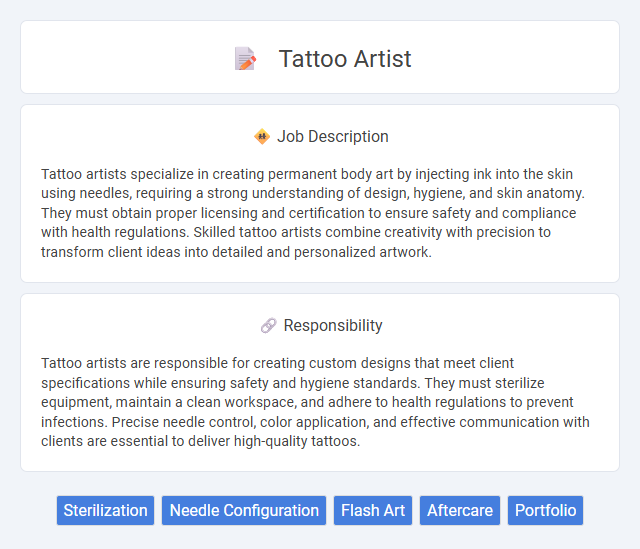
Tattoo artists specialize in creating permanent body art by injecting ink into the skin using needles, requiring a strong understanding of design, hygiene, and skin anatomy. They must obtain proper licensing and certification to ensure safety and compliance with health regulations. Skilled tattoo artists combine creativity with precision to transform client ideas into detailed and personalized artwork.
Tattoo artists are likely suited for individuals with steady hands, strong attention to detail, and a passion for creative expression. People who possess good interpersonal skills and can handle high-pressure environments may have a better chance of thriving in this profession. Those prone to sensitivity to needles, ink chemicals, or irregular working hours might find this job less suitable.
Qualification
Tattoo artists must possess strong artistic skills and a thorough understanding of skin anatomy to create precise and safe designs. Completing formal training programs or apprenticeships, along with certification in bloodborne pathogens and health safety standards, is essential for maintaining hygiene and client safety. Proficiency with tattoo equipment and knowledge of color theory further enhance an artist's ability to deliver high-quality, customized tattoos.
Responsibility
Tattoo artists are responsible for creating custom designs that meet client specifications while ensuring safety and hygiene standards. They must sterilize equipment, maintain a clean workspace, and adhere to health regulations to prevent infections. Precise needle control, color application, and effective communication with clients are essential to deliver high-quality tattoos.
Benefit
A tattoo artist likely experiences creative fulfillment through expressing unique designs and personal artistry. There is a strong probability of building a loyal client base, which can lead to consistent income and potential growth opportunities. Working in this field may also offer flexible hours, allowing for a more personalized work-life balance.
Challenge
Tattoo artists likely face the challenge of mastering intricate designs while ensuring precision and hygienic practices. They probably navigate client expectations and frequent updates to health regulations, requiring continuous learning. The opportunity to balance creativity with technical skill might demand resilience and adaptability.
Career Advancement
Tattoo artists can advance their careers by developing specialized skills in styles such as realism, portraiture, or Japanese traditional tattoos, increasing their marketability and client base. Building a strong portfolio and leveraging social media platforms helps attract high-profile clients and collaborative opportunities, boosting professional reputation. Continuous education through workshops and certifications keeps artists updated on the latest hygiene standards, techniques, and equipment, essential for career growth and maintaining industry credibility.
Key Terms
Sterilization
Tattoo artists must adhere to strict sterilization protocols to prevent cross-contamination and ensure client safety. Proper sterilization involves the use of autoclaves to disinfect equipment and single-use needles to eliminate the risk of bloodborne pathogens. Maintaining a sterile work environment is critical for compliance with health regulations and fostering client trust.
Needle Configuration
Tattoo artists must expertly select needle configurations to achieve precise line work, shading, and color blending, with common setups including liners, shaders, and mags. Needle groupings vary from single needles for fine details to clusters of 5, 7, or more for filling and gradient effects, impacting the tattoo's texture and depth. Mastery of needle configuration enhances the artist's ability to create clean, consistent, and vibrant designs while minimizing skin trauma.
Flash Art
Tattoo artists specializing in flash art create pre-designed tattoo images that clients can choose from, offering a wide range of styles and themes. Mastery in flash art requires strong drawing skills, creativity, and knowledge of skin anatomy to ensure designs are both visually appealing and safe for tattooing. Tattoo shops often rely on flash art collections to provide quick, walk-in options for customers seeking unique and personalized tattoos.
Aftercare
Tattoo artists emphasize precise aftercare instructions to ensure optimal healing and longevity of the tattoo. Proper aftercare involves keeping the tattoo clean, moisturized with specialized ointments, and protected from direct sunlight to prevent infections and fading. Clients are advised to avoid picking or scratching the tattooed area to maintain vibrant ink quality and skin health.
Portfolio
A tattoo artist's portfolio showcases their unique style, technical skill, and range of tattoo designs, serving as a critical tool for attracting clients and securing commissions. High-quality images of diverse tattoos, including black and gray, color realism, traditional, and custom pieces, demonstrate the artist's versatility and expertise. Regularly updated portfolios on online platforms like Instagram or specialized tattoo websites enhance visibility and professional credibility within the tattoo community.
 kuljobs.com
kuljobs.com